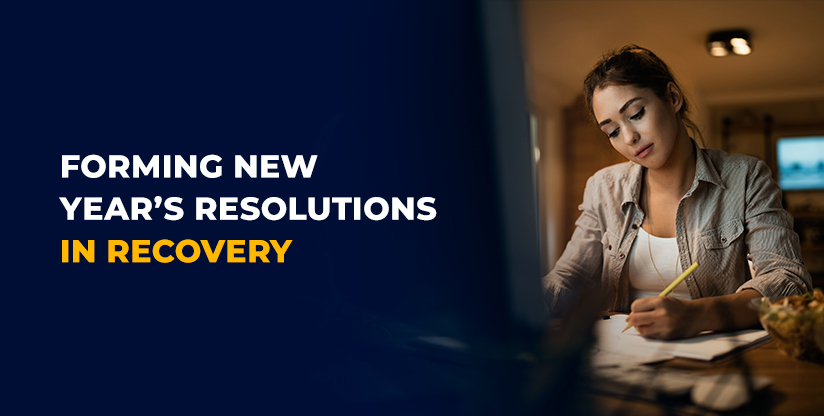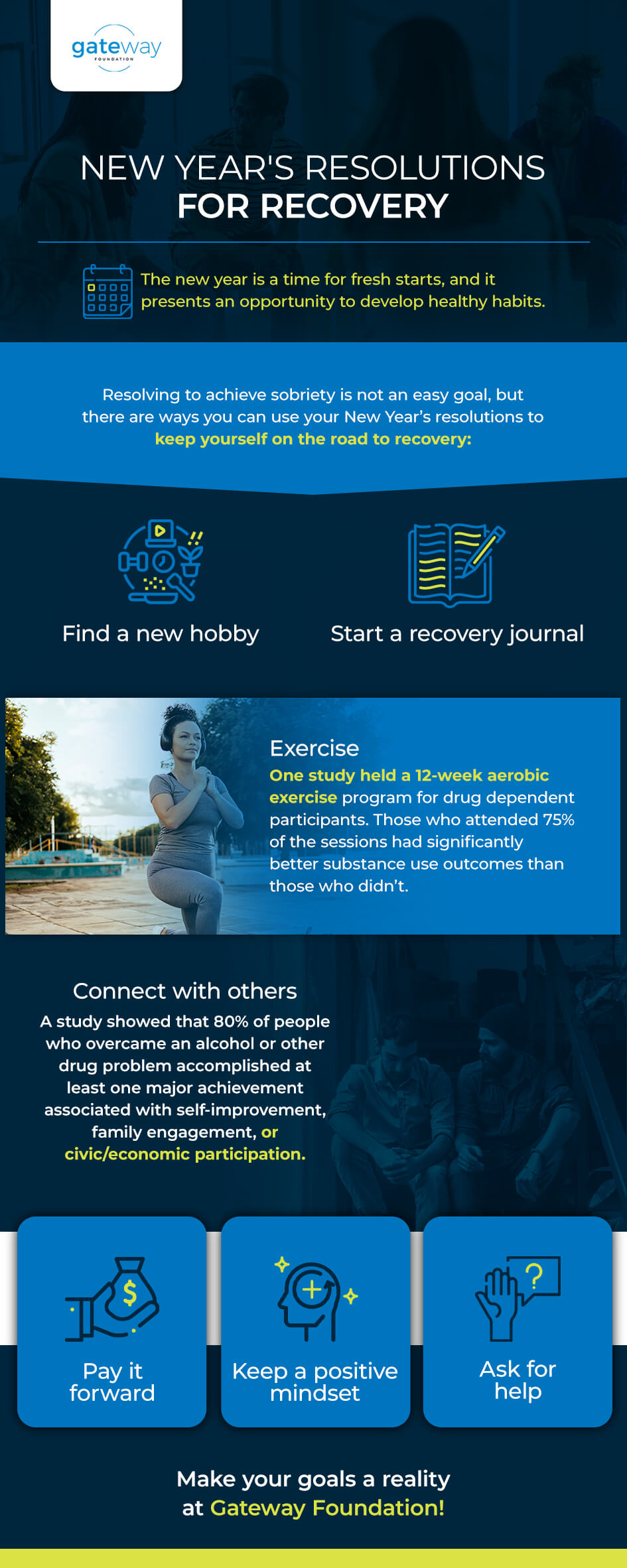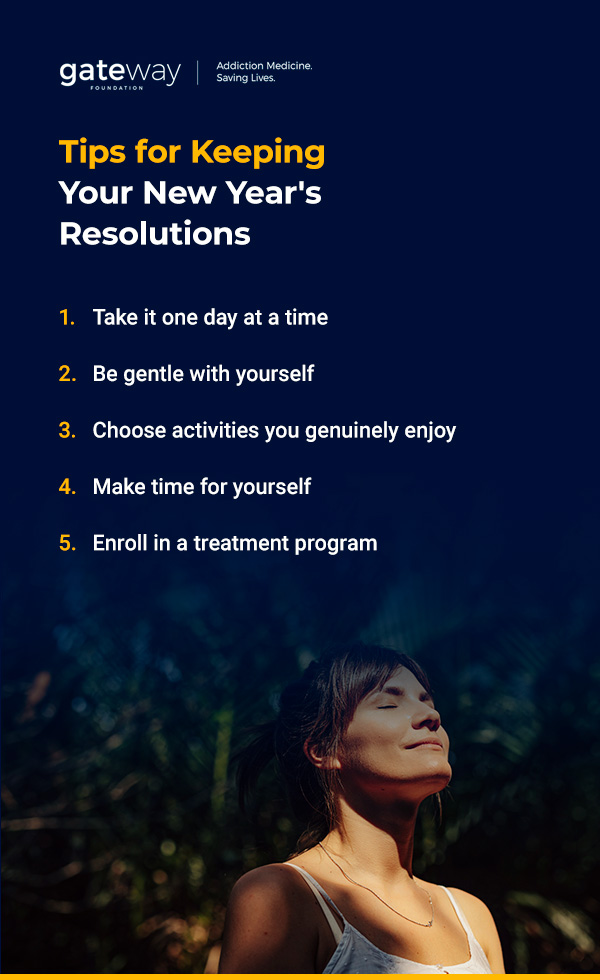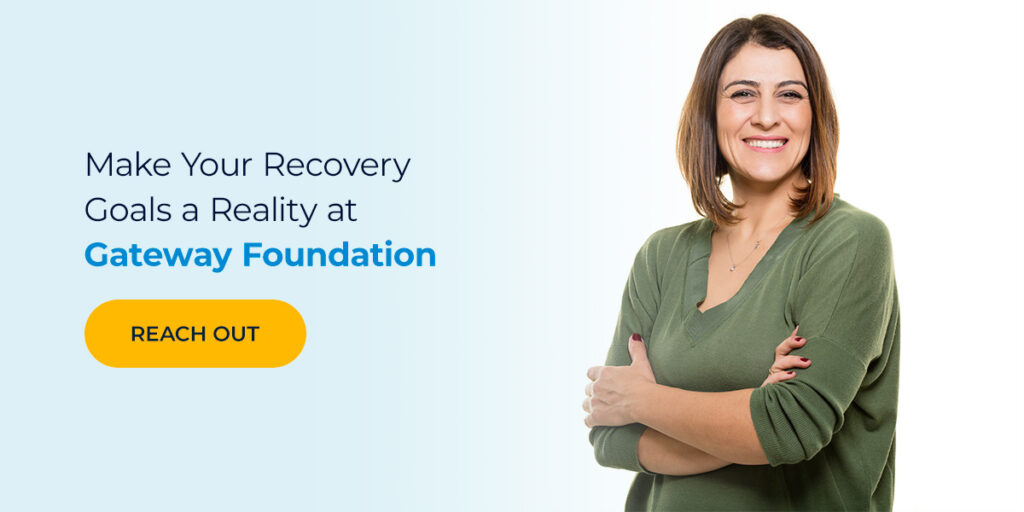- Dec 9
- Addiction

For many of us, the new year represents a fresh start and an opportunity to develop healthy habits. This could mean getting started on the road to recovery or resolving to achieve sobriety.
While recovery goals and rehab resolutions are not always easy, they’re definitely worth the effort. Freeing yourself from addiction can provide you with a new lease on life, enrich your relationships and give you more time and energy for the activities that bring you joy.
According to the American Psychological Association, making a life-changing resolution requires realistic planning. Straying from your recovery goals, even if just a little, may lead to feelings of discouragement — even if you are making progress nonetheless. However, by listing out small, manageable steps to reach your goals, you will be more able to stick with your resolutions and get back on track after any hurdles.

7 New Year’s Resolutions Ideas for Those on the Path to Recovery
The following resolutions may inspire you to stay on the path to recovery in the new year:
1. Find New Hobbies
Part of being in addiction recovery means finding creative ways to enjoy your free time without substances. You can try as many hobbies as you like before finding a few that you genuinely enjoy.
Some examples include:
- Learning a new language
- Playing an instrument
- Painting
- Attending cooking classes
- Going to art galleries or museums
- Going bowling
- Exploring an interest in foreign films
There are so many fun activities out there for you to explore in recovery.
2. Start a Recovery Journal
Writing in a journal for even 15 minutes a day is an excellent tool for understanding your emotions, effective coping strategies, and what triggers your cravings. Whether it’s in the morning or each night, take a few minutes to write. Journal entries might involve a person, feeling, material possession, place, or opportunity — anything. You might document your addiction recovery goals, things you’re grateful for, how you’re implementing healthy coping skills, or keep track of the highs and lows of the day.
At the end of the year, you can see all you’ve accomplished and what you’re thankful for. It’s a small but simple way to bring more positivity to your life and focus on your strengths. Of course, there will be challenges along the way, but resolve to focus on your successes no matter how small as you start journaling.
3. Exercise

Get physical and active this New Year! The healthy change doesn’t have to be drastic. Focus on a few minor changes, like running a few miles a week or eating three nutritious meals a day. You might also resolve to get at least eight hours of sleep every night. Any of these goals can put you on a healthy track toward breaking your addiction.
A healthy routine can substantially impact your physical and mental health. Various studies show how exercise can reduce stress and anxiety and help you sleep better.
4. Connect With Others
Recovery can feel isolating at times. You may think that others don’t understand what you’re going through, which can make you feel lonely. If you have friends or family members reaching out to help, however, make an effort to connect with them. Choose a group of loved ones you can lean on for support in the new year. Don’t be afraid to confide in them and allow them to help you. This one small change can make a considerable difference in your addiction recovery.
5. Pay it Forward
If you’ve been on your recovery journey for a while, reflecting on all the support and love you’ve received along the way can be helpful. Pay it forward by resolving to do one kind thing for others each day. You could even serve as a sponsor for someone else in recovery or volunteer in your community.
Being in recovery means understanding how you can help yourself and others. Small acts of kindness like helping a neighbor or volunteering at a soup kitchen or animal shelter can boost your self-confidence and create a stronger relationship with your community.
6. Keep a Positive Mindset
When it comes time to create new goals for your new year of recovery, try to stay positive. It can be easy to slip into feelings of frustration at times, though a positive mindset can help you heal. Try to channel your emotions through positivity — make a list of all the things that make you happy and choose a few items when you’re feeling down. For instance, you might listen to a happy song, repeat a positive motto to yourself, or dance! Anything emphasizing positivity can put you in the right mindset for the new year.
Incorporating mindfulness meditation into your recovery plan can also help you release negativity and put yourself in the present moment. Yoga, journaling, or simply drinking a nice hot cup of tea or relaxing with a pet can positively affect your mental health.
7. Ask for Help

A great recovery plan for the New Year is to reach out when you need help. Addiction is a complex condition that can be triggered by things out of our control. In particularly stressful times, call a sponsor or a supportive recovery friend. You might also seek professional care in the form of inpatient or outpatient care, support groups, or behavioral therapy.
Therapists are trained to provide relapse-prevention techniques and help you build coping skills for times of stress. You are never alone in your journey — friends and support groups are always here to help whenever you ask. You’d be surprised to see just how much you can change in a year with the help of a sound support system. So, make asking for help part of your New Year’s resolution.
How to Set SMART Goals for the New Year
How do you make your New Year’s resolutions stick? First, your recovery goals must be realistic. You may find it helpful to use the acronym SMART when setting your new goals. These goals should be specific, measurable, achievable, relevant, and time-bound. When developing your SMART goals, try to make sure they meet these parameters:
- Specific: Provide enough detail so that there is no indecision regarding what exactly you should be doing.
- Measurable: When you can see measurable progress toward your goals, you can mentally take note of change as it occurs. A quantifiable goal has an outcome that can be assessed as a success or failure, or on a sliding scale.
- Achievable: A goal should be feasible given your current economic, social, or cultural resources and time available.
- Relevant: Relevant objectives should answer a few questions. Ask yourself why you should pursue this goal and what the impact will be on your life when you do.
- Time-bound: Set a time frame for your goal. You could aim to get it done next week, next month, or in three to six months. Setting an endpoint for your goal gives you a clear target to achieve. Of course, some goals will take longer to achieve than others.
Tips for Keeping Your New Year’s Resolutions

Here are a few tips that can help you keep your New Year’s resolution to remain in recovery:
- Take it one day at a time: To make your recovery plan more manageable, focus on staying sober one day at a time. Sobriety is a daily choice and the present moment is the only thing we have actual control over. Wake up and reaffirm your goals each day. Soon, you’ll look back and see all the progress you’ve made as these individual days add up.
- Be gentle with yourself: Forgive yourself for any mistakes you might make. Setbacks are common in addiction recovery and don’t mean you’ve failed. Instead, they mean it’s time to adjust your goals and continue working on minor daily improvements. Keep positive and try not to judge yourself in recovery — hope will motivate you to continue down a healthy path.
- Choose activities you genuinely enjoy: In the beginning, it can be challenging to focus on new activities after a long time of substance use. Focus on the hobbies you genuinely like or explore untapped passions that can help you replace harmful habits with healthy and rewarding ones.
- Make time for yourself: While staying active and maintaining structure in recovery is essential, don’t forget about yourself. To avoid burnout, block a little time out of each day just for you. Take a moment to reflect, practice gratitude or participate in a mindfulness activity to aid your healing.
- Enroll in a treatment program: While some can abstain from substances or alcohol solely with 12-step meetings, professional treatment is essential to any recovery plan. In therapy, you can learn crucial relapse-prevention techniques to stay sober and receive detox to avoid dangerous and uncomfortable withdrawal.
Make Your Recovery Goals a Reality at Gateway Foundation
Recovery is a courageous choice, but you don’t have to heal on your own. If you’re considering starting the new year with a recovery plan in mind, professional treatment centers can help set you up for success. At Gateway Foundation, we provide a sense of community and support to help you through recovery and maintain sobriety.
With evidence-based therapies and holistic methods, our services are designed to address each unique patient and their entire needs. You can find the type of care that works best for you, from medication-assisted detox and behavioral therapy to recreational activities. Our highly trained and compassionate team will devise an individualized care plan to help you overcome addiction and start the new year right.
To learn more about our treatment programs, reach out today.



